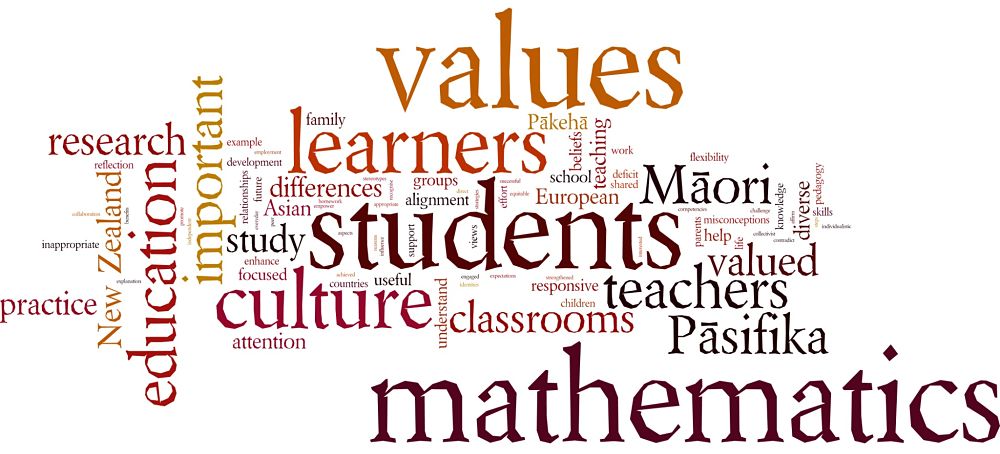
Julia Hill
Master of Educational Psychology, 2017
Supervised by Dr Jodie Hunter, Prof Roberta (Bobbie) Hunter & Prof Glenda Anthony
Centre for Mathematics Education Research, Institute of Education, Massey University
New Zealand, like many countries, has an increasingly diverse student population. Currently, New Zealand also has one of the largest ethnically driven achievement gaps across all developed countries, with Māori and Pāsifika students being much more likely to underachieve when compared to all other ethnicities. To disrupt these trends and achieve equity for students from all cultures, educators must attend to diversity by enacting culturally responsive teaching practices.
One aspect of culturally responsive teaching practice involves teachers considering students’ cultural values. Several research studies (e.g., see here and here) have shown that equitable education outcomes can be achieved when teachers attend to students’ cultural values in the classroom. Until recently, mathematics – unlike other subjects, such as English – has often been considered to be value-free. As such, mathematics education research and practice have traditionally focused on skills, techniques, and knowledge acquisition, with mathematics being understood as something students do. These perspectives have often resulted in teachers ignoring students’ beliefs, attitudes, emotions, and values.
There is now widespread consensus, however, that mathematical teaching and learning are, in fact, value-laden (e.g., see here, here, and here). Given this understanding, my Masters research focused on exploring the types of mathematics education values espoused by Pāsifika, Māori, Pākehā/European and East Asian middle school students in New Zealand. Mathematics education values are concerned with what a person (a teacher, student, or parent/family member – but in the case of my study, a student) perceives to be of worth or importance for learning mathematics. These values reflect people’s personal and cultural learning preferences, where teachers and their students’ bring their own mathematics education values into the classroom. To date, no known research has specifically explored the types of values espoused by mathematics learners from different cultures, particularly those students from indigenous or marginalised cultures. As such, the findings from my study provide a useful starting point for developing an evidence base around mathematics education values in New Zealand, as well as contributing to the international mathematics values literature.
What I did
I investigated the mathematics education values espoused by a cohort of 227 middle school (Years 7 and 8) students across four urban New Zealand schools. The participants identified as one of four ethnic backgrounds; in total the sample included 30 Pākehā/European, 25 East Asian, 41 Māori and 131 Pāsifika students.>
I followed a mixed methods approach and focused on the use of student voice to guide the interpretation of values. All students completed a survey where they ranked 12 mathematics education values in order of importance. Following the survey, all 227 students were interviewed to allow me to better understand their reasons for ranking particular values as being more or less important.
What I found
I found that the culturally diverse middle students in my sample shared three mathematics education values: utility, effort/practice and flexibility. This finding means that in my study, students from all cultures:
- valued mathematics learning which was useful for their everyday life or for future education/employment;
- felt that it was important that they practised their mathematics; and
- felt that their mathematics learning was most successful when they had a flexible bank of mathematical strategies to call upon.
Beyond these shared values, there were also some differences in the values that students from different cultural groups endorsed as being most and least important for their mathematics learning. These differences in the Māori, Pāsifika, Pākehā/European and East Asian students’ mathematics education values appeared to be reflective of the students’ cultural values. For example, the Māori and Pāsifika students in my study expressed the view that ‘peer collaboration and group work’ and ‘family support’ were important for their mathematics learning. These mathematics education values seem to align with the collectivist values of Māori and Pāsifika cultures. In contrast, the Pākehā/European and East Asian students valued teacher explanation and independent learning, mathematics education values which may be reflections of these groups’ individualistic cultural values.
Why these findings are important
The results of my study highlight the alignment of students’ broad cultural values with their mathematics education values, demonstrating the importance of attending to culture in diverse mathematics classrooms. Recognising what is valued (or not valued) by students in the mathematics classroom is an important prerequisite for culturally responsive teaching practice. When teachers understand students’ values, they can develop classroom cultures or pedagogies that align with the students’ values; they can also take steps to explicitly address inappropriate values or values which may contradict the classroom norms and pedagogy.
My research may also help discount some of the misconceptions and stereotypes relating to Māori and Pāsifika learners. For example, many New Zealand teachers incorrectly believe that Māori and Pāsifika parents are not interested in their children’s schooling, or that parents do not have the knowledge or mathematical skills to help with their children’s homework. In addition, many teachers may (unknowingly) hold deficit views, or low expectations towards Māori and Pāsifika learners. My research offers a direct challenge to these misconceptions and deficit beliefs, as in my study the Māori and Pāsifika students valued effort and practice as well as and family support as very important aspects of their mathematics learning.
When values are acknowledged in the mathematics classroom, there are significant benefits. Past research (e.g., see here, here, here, and here) tells us that relationships are strengthened; students’ cultural identities are affirmed; students become more engaged; and, ultimately, mathematics learning is enhanced. Teachers’ attention to student values can also help foster the development of the key competencies necessary for empowered 21st century mathematics learners. Thus, by working to influence and promote appropriate values in the mathematics classroom, teachers may not only enhance students’ mathematics learning but also make positive differences to students’ life chances and future civic participation.